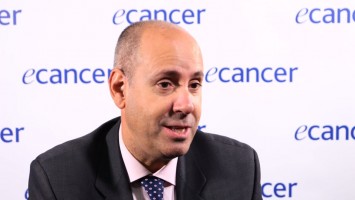The monarchE trial is a randomised phase III study in the adjuvant setting which has looked at the role of abemaciclib combined with endocrine therapy in high risk hormone positive HER2 negative early breast cancer. We know for many hormone positive patients the outlook is good and their treatment in the early breast cancer setting can be curative. But there are a group who have high risk clinical and pathological features where we know that up to 20% can relapse within the first years, despite the best standard of care that we give them, including in the majority of these patients chemotherapy. So those are patients who have high nodal burden, four or more involved lymph nodes or, if 1-3 nodes, have increased risk factors based on a large tumour, more than 5cm, high grade cancer, grade 3, or increased proliferation measured by Ki67.
So this was the high risk group that we recruited into monarchE and 5,600 patients from 38 countries around the world took part and were enrolled into the study over a two year period. The results show that the addition of abemaciclib to endocrine therapy results in a 25% reduction in the risk of developing invasive disease recurrence. At the two-year point that translates into an absolute difference of 3.5%. So that means 11.3% of patients have recurred while on their endocrine therapy alone but less than 8% have developed recurrence if they took abemaciclib.
This is clinically meaningful, primarily because most of the recurrences that were prevented were distant metastases, particularly in bone and liver metastases. So these patients who have a high risk, who are destined on endocrine therapy alone to have an increased risk of recurrence in these first few years and develop resistance to endocrine therapy that they’re on, they can be treated now with the combination of abemaciclib with endocrine therapy which seems to delay or prevent resistance and recurrence occurring.
Now, the drug does have some additional side effects. We know about that because we use the drug in advanced breast cancer in combination with endocrine therapy. Diarrhoea is the most frequent adverse event followed by fatigue and measured neutropenia. The diarrhoea is managed by early intervention with anti-diarrhoeal agents such as loperamide and either dose omissions until the symptoms settle or dose reductions. Diarrhoea occurs in the first week on average, lasts a few days and with appropriate intervention in the trial less than 5% had to come off due to that adverse event. Many patients, 40%, settled on a lower dose and we know in advanced disease that that lower dose can be as effective as the higher dose, you just find the right dose for that toxicity.
The neutropenia rates are much lower than with the other CDK inhibitors and very few, if any, patients experienced febrile neutropenia. So the safety profile is very consistent with what we’ve seen with abemaciclib in advanced disease however there was one new additional finding that the troublesome adverse events of endocrine therapy, namely arthralgia and hot flush which occur in 30% and 20% of endocrine therapy treated patients alone in the trial, that was reduced, each of them, by 30% with the addition of abemaciclib. We’ve seen this in another early breast cancer trial before, a neoadjuvant study, PALLET, of letrozole and palbociclib. So I think it is a genuine finding but we don’t quite understand what the mechanism of that interaction might be.
So, to summarise, for these high risk patients that we know have a 20% chance of cancer coming back within five years, this trial offers hope because there’s a new therapy that can treat endocrine resistant cells and can prevent that recurrence by 25%. If this drug becomes approved then we hope that this will become a standard of care for this very select group of high risk patients.








